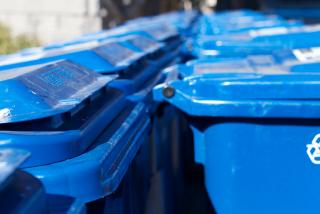Giving Up Trash for Lent
By Annie Gonzalez Milliken
Living the Wasteless Life
by Carter Smith
My story actually begins almost a year ago, when one of my Facebook friends posted an article about Lauren Singer, blogger at Trash is For Tossers. She has become well-known in recent years for fitting two years of her trash into a single mason jar. I was astounded because I had never heard of anything like it, even in my growing environmental consciousness within the first year of my college career. Hearing that something known as a “zero waste lifestyle” was possible for people living in industrialized Western societies seemed both outlandish and amazing. From there I spent weeks reading pretty much any literature out there about waste reduction and this lifestyle.
There’s an unusual spiritual practice I’ve picked up, and it probably came about by being a lifelong Unitarian Universalist, and learning to challenge societal norms. For years I’ve enjoyed stretching my daily habits by creating personal challenges to attempt to live up to. A couple of years ago I became a full-time vegetarian as a result of one of these challenges, and I have had some less successful ones as well. I have gone through periods of meditating every day, attempting to teach myself skills like drawing and playing instruments. Even the challenges that I do not stick with in the long run, or ones that I do not really actually complete have been valuable for my own spiritual exploration. I absolutely love the feeling of setting out to accomplish a goal, learning my limits, and doing something above and beyond my standard daily life. As a result of this tendency, being Zero Waste was incredibly appealing, and I wanted to at least give it a shot.
In doing informal research I learned a lot about the destructive waste habits of the average American, but also discovered that people were doing this “Zero Waste thing” all over the world, in so many stages and modes of life. Generally, they follow the same basic principles but have their own reasons and methods for working towards minimizing their personal waste production. This whole community was so inspiring, and so I started taking small steps in that direction: I purchased soap nuts and wool dryer balls for waste-free laundry, and made it a policy to always remember my reusable bags when out shopping.
Throughout this process I became much more aware of the sheer amount of waste I had been sending to the landfill. It became a mindfulness practice that gave me clarity about my particular life and its impact within our larger web of existence. I also realized the immense privilege I experience as a college student in my beloved hippie town of Asheville, where I can expect easy access to recycling programs and bulk shopping, as well as a great on-campus composting program. With such amazing sustainability resources, there was very little holding me back. This Lent was the excuse I needed to take the plunge and really commit to not sending anything to the landfill.
Lent was an opportunity long enough to form daily habits, but with an end in sight to know when I had accomplished this goal. Then, I set rules for myself. I counted “trash” as any product or packaging bought for my own consumption that could not be composted or recycled. I did not include items bought before the start date, February 8, or anything given to me by someone who did not want it go to waste. Another important rule was to treat myself and this practice with loving kindness, and to realize that mistakes were part of this process of growing that should be appreciated as such. Lastly, the ultimate goal of this practice was to live more fully and mindfully, so I would avoid restricting myself to the point of causing unnecessary stress. So, a couple of times I forgot my travel mug and recycled the disposable cups at my favorite café, and I even used a plastic spoon at a community meal where I didn’t think to bring my own utensils, and that was okay.
Even though Lent has ended, I am attempting to continue this lifestyle to the best of my abilities. The days of having to stare my trash in the face as it sat in a jar on my desk was an amazing way to be aware of the impact of my daily consumption habits. Landfills and waste incinerators are spreading, and primarily causing direct negative environmental and health impacts on the marginalized communities in which they exist. I have come to realize that the system we exist within makes it nearly impossible for most people to have environmentally conscious consumption habits, or even to have access to education on these issues. Officially going Zero Waste is a transformative experience that I am so happy that I have the ability to do.
I’ve already gotten so much support from my family and my community, and people say that I have inspired them. I love it when I avoid Styrofoam takeout containers by bringing my own reusable one when I go out, and the waiters praise me for being so prepared. I love being able to cook for my friends from fresh, often local, package-free ingredients. I know I have a lot more to learn, and that there will probably be more challenges in the future. Even so, the entire experience has honestly been so much easier than I expected, and more spiritually fulfilling than I could have imagined.
Carter Smith is a current student at the University of North Carolina at Asheville, where she is the co-president of her campus ministry. She is also a former Unitarian Universalist College of Social Justice summer intern for Standing on the Side of Love, and an alum of programs like the Unitarian Universalist Association Summer Seminary. She is majoring in Religious Studies and minoring in Political Science, and is an organizer for voting rights and student representation in her school system.


